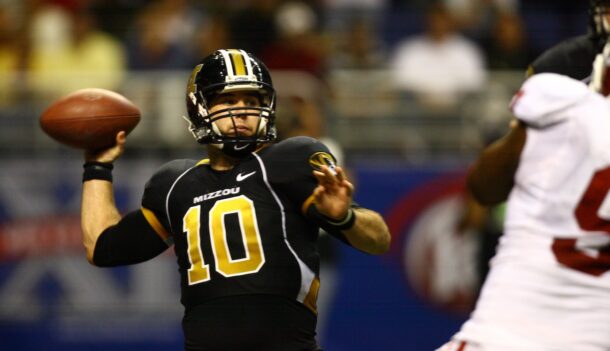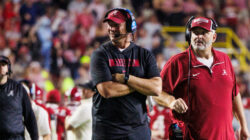
DBU? Whether Florida can truly contend in 2020 may depend on improved safety play
One of the timeless debates in college football is who can truly claim the mantle of DBU?
The “answer” seems to change every season and usually depends on the metric you emphasize. Is DBU the school that produces the most pros or the one that produces the best pass defense numbers year-in, year-out? Is DBU the school that produces the most future All-Pros and Pro-Bowlers, or is it the school that produces the most All-Americans and All-Conference selections? Is it, more likely, a combination of all of the above? Whatever metric you emphasize, the debate among the contenders: Alabama, Florida, Florida State, LSU, Miami, Ohio State, Texas — tends to be heated, fertile fodder for Twitter trolls and social media wars.
The Gators’ place in the “debate” over DBU is secure, what with 15 defensive backs drafted since 2010 (3rd in college football), 5 drafted in the first round since 2010 (4th in college football), 24 drafted since 2000 (3rd in college football), 12 consensus All-Americans since 2000 (3rd in college football) and a top-10 pass efficiency defense 16 of 20 seasons since 2000 (best in college football).
Given the history, you almost expect Florida to be dominant on the back end of the defense. Even when the Gators were mired in the mud as a program in the post-Meyer decade, Will Muschamp and Jim McElwain’s teams were consistently churning out outstanding defensive football teams, often on the strength of their secondaries.
That’s why it’s morbidly curious that the strength of Florida’s 2020 defense, and just how good the Gators can truly be as a football team in 2020, may depend on improved play in the secondary, and one position group in particular — safety.
Florida finished outside of the top 30 in pass efficiency defense (32nd), passing yards allowed per game (32nd) and yards allowed per pass attempt (60th) for the first time since a young 2007 secondary took its lumps before becoming one of the nation’s best in 2008. While many programs might accept a pass defense that ranks in the top 40 in multiple metrics, that’s well below the program standard at Florida, and last season represented the worst performance from a pass defense standpoint the program had in the 2010s, edging the 4-7 group from the ill-fated 2017 season for that dubious distinction.
Before you tell me I’m taking crazy pills and that in fact, replacing the production of steady senior David Reese and All-SEC performer Jon Greenard at middle linebacker and Buck will be more pressing, let’s dive into the details, shall we?
Yes, the Gators are loaded at corner.
Marco Wilson returns to captain the football team and provide, as he has every year he’s been healthy, a rock of consistency to the group. Wilson is also a terrific singular example of just how versatile Florida will be on defense in 2020, something Todd Grantham has, innovatively, always valued in his defensive units and that has become increasingly important in defending the modern RPO offenses that now dominate the game.
Wilson can handle coverage on the edge against the opponent’s best receiver and excel against the challenge of tackling on the edge against the outside run game. He’s also physical enough to jar slot receivers and tackle in the scrum if he lines up in the nickel. His versatility should allow Florida to be matchup specific with budding star Kaiir Elam, statistically already one of the best returning coverage guys in the SEC and the player with the combination of speed and physicality to cover your best guy on an island.
Chester Kimbrough played in 8 games as a true freshman and Grantham has raved about the strides he’s made in the offseason. He’s a kid who loves contact too, which makes him versatile in how Florida can line him up. Jaydon Hill appeared in 10 and returns healthier and bigger and stronger.
Jahari Rogers, Ethan Pouncey, Avery Helm and the recently reclassified Kamar Wilcoxson are all blue-chip newcomers who round out a star recruiting class.
In other words, there’s no shortage of talent at corner.
But that was the case last year, with CJ Henderson (first round, Jacksonville) in the mix. We kind of knew Florida would still be good at corner, right?
The problems have been at safety.
That eyesore of a yards-allowed per pass attempt rating? That was due to a defense that finished 83rd in college football in defending pass plays of 30 yards or more.
What’s worse is that the numbers are, as you’d expect, the worst against the best quarterbacks. Against Georgia, LSU and Virginia — the 3 times a season ago when Florida faced a quarterback who had been an All-Conference selection or finished in the top 25 in the country in pass efficiency, Florida’s numbers were nightmarish. Jake Fromm, Bryce Perkins and Joe Burrow combined to torch Florida by completing 73.4% of their passes for 895 yards, 9 touchdowns, only 1 interception and a staggering average of 9.5 yards allowed per pass attempt.
That is simply not championship level pass defense.
Florida’s schedule in 2020 might not be best-suited to test the weakness consistently, but Mac Jones, JT Daniels (if healthy), Terry Wilson (he beat Florida once) and Kellen Mond are all plenty good enough to do it on any given Saturday.
The word out of Florida’s camp about the safety position continues to be that the group offers “experience.” You don’t hear much about high-end talent.
There’s a reason for that.
Donovan Stiner (pictured above) is the group’s vocal leader, the guy Ron English has singled out for leadership capabilities all camp. He has had his moments as a Gator, including a bone-rattling blitz hit and sack of Nick Fitzgerald at Mississippi State in 2018 to help seal Florida’s first big win of the Mullen era.
The final sack to end the game but with Jim Ross on the call.#GoGators #UFvsMSU pic.twitter.com/JdgP9nydHM
— Bobby Carney (@iamcarneyb) September 30, 2018
But as fun as that play is, it demonstrates Stiner’s strengths: a spot blitzer and run-stuffing safety. He led the Gators with 4 interceptions last season, but per PFF, he has not been, at least to date, a plus pass defender.
What about Brad Stewart?
The former blue-chip from New Orleans is probably, pound for pound, the most talented veteran safety Florida has. He was, according to Pro Football Focus, a midseason All-American in 2018, and his pick-6 of Burrow sealed Florida’s victory over LSU in The Swamp that season.
Stewart sends The Swamp into hysteria!
Pick six for @GatorsFB! pic.twitter.com/gpOnYqEFiU— CBS Sports (@CBSSports) October 6, 2018
His issue? Staying out of the coach’s doghouse, on the field and consistent. Stewart made only 4 starts last season after an early-season suspension and if it weren’t for Trey Dean, a fellow blue-chip who trains at both corner and safety, falling off the map from a production standpoint, Stewart’s decline in 2019 would have been a much bigger story.
Shawn Davis, the most lightly recruited of the core veteran group, is probably the most complete football player. Davis made 51 tackles and collected 3 interceptions a season ago, and his nose for the ball stands out on film, at least according to one AFC front office scouting executive who spoke to SDS for this column.
“Davis is very good already. He’s a little undersized, but he’s fast. For him, it’s a consistency issue, especially in intermediate pass coverage, where we thought he was picked on a bit last season. He has to get more comfortable picking up routes and on his jumps. But the room for growth and a big year is there.”
Davis was picked on — to the tune of 53.5% completions against — in intermediate pass coverage in 2019. That number needs to improve, but Davis is a very good tackler with excellent speed. If he can build on what safeties coach Ron English has called an outstanding camp, the Gators may have at least one veteran who fits the mold of the classic Gators safeties of the past: Keanu Neal, Marcus Maye, Matt Elam, Ahmad Black, among recent stars.
Are there wild cards?
Probably. Amari Burney played the Star position in the Orange Bowl and fans and coaches alike have raved about his versatility ever since he set foot on campus. Grantham likes the blend of speed and size Burney offers for his hybrid safety/nickel position, and if — broken record — he can find consistency, the talent is there. Burney made 15 of his 37 tackles in 2019 in his final 3 games — if he continues that trend, it’s a good sign for the Gators.
Rashad Torrence and Mordecai McDaniel are both blue-chip true freshmen that enter the fold as well. Of the two, Torrence seems to be the one opening the most eyes in camp. He has shown a nose for the ball and physicality that suggests he might play early. And of course there’s the matter of Trey Dean, who needs to regain his confidence but played well enough to merit All-SEC freshman team honors once upon a time.
In truth, Florida’s safety room is a work in progress, the kind of unit that is probably a recruiting class away from where the staff wants it to be. But those excuses don’t help Florida in 2020, a season the Gators enter with championship aspirations.
Whether the Gators can live up to those expectations may depend on whether DBU can get its safety swagger back.
Neil Blackmon covers Florida football and the SEC for SaturdayDownSouth.com. An attorney, he is also a member of the Football and Basketball Writers Associations of America. He also coaches basketball.







